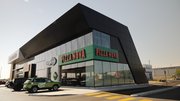Article
FCES15: Real estate decision requires lots of homework, data insight
As any business owner knows the location decision can sink the business or be the foundation of initial success and growth. But it involves much more than negotiating a lease or property purchase.

October 23, 2015 by Judy Mottl — Editor, RetailCustomerExperience.com & DigitalSignageToday.com
During this week’s Fast Casual Executive Summit there were several top-of-mind focus points debated, discussed and analyzed by experts, retailers, QSR operators, vendors and restaurant owners. The list included mobility, millennials, engaging the customer, building the brand and driving a riveting customer experience.
But as one panel discussion drove home, all those critical strategies and topic points come after one of the most, if not the most, important decision made in the retail and restaurant operations effort: where to put that next storefront or franchise location.
As any business owner knows it’s a decision that will either grow the business but also boasts the bleak reality of sinking the business if needed homework isn’t completed and if data, on everything from customer demographics to traffic patterns to square-footage cost trends, isn’t analyzed to the max.
"It’s all about avoiding the miss, and making the location choice a better choice," Stephen Polanski, senior vice president of sales at Buxton, stated as he introduced a panel of experts speaking on the issue. The "Real Estate Growth by Numbers" session Tuesday featured Casey Askar, chairman and president of Askar Brands; Anand Gala, founder and CEO of Gala Holdings International and Ray Wiley, co-founder of Hot Head Burritos.
The first step in real estate decision making, whether it’s a first location or a 100th location, is to make sure the operations team focuses as much on the community’s demographics as it does the bottom line costs of renting, leasing or buying property.
"It’s about knowing your brand, defining the brand and based on that determining if the community supports the brand," Gala said. For example, if the brand is geared toward the Baby Boomer a location within a university likely isn’t a good fit. But if the intended target consumer is the millennial it’s a better choice.
"We preach customer, customer, customer and to use tools to avoid what is called the ‘dog.’ There is no data element that will be the silver bullet," Gala said.
The potential to get a great lease deal is not more valuable than ensuring the location will not only support the business but ideally grow the business.
"You have to know the demographics, know the neighborhood. You have to know where community residents cut through back streets to navigate around the community and traffic patterns. They are a huge factor," Wiley shared.
Finding the best site involves everything from defining the brand, to ensuring the target customer profile is on target to ensuring that the potential site can meet the development schedule that may be in place — which often is dictated in a franchise scenario, noted the panel.
"Moving into a new market requires granular insight on the front end. It’s about positioning the brand to be successful," Polanski said. Not only will such data help determine where to go, in terms of location, it can help guide on where not to expand, Gala noted.
One misstep many retailers and restaurant operators make, stated Askar, is not only not understanding the invaluable role a real estate broker plays but how that relationship and the knowledge brokers have about such granular data is vital.
"You need the broker relationship and they can really help guide you," he explained, advising panel attendees to network with members of ICSC(International Council of Shopping Centers) and attending its events.
"This is the largest investment for the franchisee or owner and it is often a sensitive decision (in regard to the huge financial decision) and having that broker relationship is a huge benefit," he said.
One good rule of thumb is to keep location cost to under 10 percent of top-line revenue in order to start off on a healthy financial footing. The panel also noted that unlike several years ago, it’s much more a landlord and property owner’s marketplace.
And, concluded Askar, keep in mind that while a real estate decision is critical, once it’s done it’s done. It’s not as hard as the toughest job facing restaurant and retailers.
"That,"" Askar said, is "running the business."









